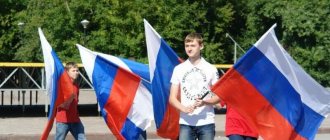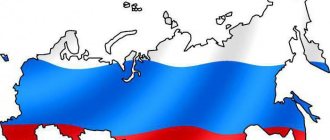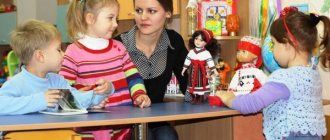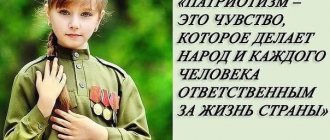Patriotic education of children of primary preschool age.
Patriotic education of children of primary preschool age.
The first feelings of patriotism. Are they accessible to children?
Based on many years of experience of my work in this direction, we can give an affirmative answer: preschoolers, younger children, have access to a feeling of love for their native village, native nature, and their Motherland. And this is the beginning of patriotism, which is born in knowledge, and is formed in the process of purposeful education. Currently, a new social type of personality is entering the historical arena. Russian society requires business-minded, self-confident, independent people with a strong personality. Solving the problem of educating patriotism requires a new ideology in educational and educational activities. The idea of cultivating patriotism and citizenship becomes a state idea.
Moral and patriotic education must be practiced from early preschool age. During this period, the formation of the child’s spiritual and moral foundation takes place, and the process of self-awareness in the world around him begins. How it is formed in the first years of a child’s life largely determines his entire subsequent development. During this period, such character traits begin to develop that invisibly connect him with his people, his country. The roots of this influence are in the language of the people that the child learns, in folk songs, music, games, toys, impressions about the nature of his native land, about the work, life, morals and customs of the people among whom he lives.
The goal of instilling patriotism in children of primary preschool age is the formation of a spiritual and moral attitude and a sense of belonging to the family and home.
The goal defines the following tasks:
1. Instilling in children feelings of love for their native land, their family, their native nature, culture and traditions;
2. Create an emotionally prosperous atmosphere in relationships between adults and children;
3. Exercise children in showing compassion, care, and attention to loved ones.
I bring to your attention my experience in patriotic education.
In accordance with the relevance of solving issues of moral and patriotic education and based on the tasks in the program being implemented, I set a goal - to create optimal conditions for the development of moral and patriotic feelings among young preschoolers.
I carry out patriotic education in direct educational activities, in joint and independent activities, for which I create a developing subject-spatial environment.
Small Motherland in the Patriotic Education of Preschool Children
The article analyzes domestic research in the field of patriotic education of preschool children. The features of instilling a sense of patriotism in preschoolers based on the material of folk national culture are revealed. The spiritual and moral potential of the small homeland is revealed in the patriotic education of children of preschool educational organizations. Recommendations are given for familiarizing young children with the elements of their small homeland, as an effective means of developing patriotic education.
Key words: small homeland, patriotic education, preschooler, sense of patriotism, folk culture, preschool educational organization.
Abstract.
The article is devoted to analysis of domestic research in the field of Patriotic education of children of preschool age.
The specifics of education in pre-school children a sense of patriotism in the material folk culture. Reveals the spiritual and moral potential of the homeland in the Patriotic education of children of preschool educational institutions. Recommendations to familiarize young children with the elements of the homeland, as an effective means for the formation of Patriotic education. Keywords:
small motherland, patriotism, preschooler, patriotism, popular culture, educational organization.
Patriotism is love for the native land and Motherland, its natural resources, culture, people and home. Currently, more and more often in this direction, patriotism is acquiring the status of the highest value, assimilating moral, spiritual, historical and many other elements. Patriotism is the embodiment of love for the country and the Fatherland, the presence of a close connection with the history and culture of the nation, achievements and failures - all this constitutes the spiritual and moral basis of the individual, which, in turn, forms in him the position of a citizen and the need to participate in the life and destiny of his Fatherland.
Many scientists, teachers and psychologists, such as N.V. Aleshina, N.F. Vinogradova, A.D. Zharikov, S.A. Kozlova, N.G. Komratova, N.K. Krupskaya, L.E. Nikonova, V.A. Sukhomlinsky, K.D. Ushinsky studied various issues of patriotic education.
Kozlova S.A. in his works he talks about patriotic education as a purposeful process of pedagogical influence, the purpose of which is to enrich the knowledge of preschool children about the Motherland, the formation of patriotic feelings, instilling standards of moral behavior, the formation of a sense of duty, the development of the need to benefit the people and the Fatherland [6, p. 134-135].
Nikonova L.E. defines patriotic education as the process of assimilation of the heritage of traditional national culture, the formation of an attitude towards the country and state where a person lives [8, p. 53].
The purpose of patriotic education is the formation of the foundations of patriotism as the moral side of the individual, the development of the individual as a socially active member of society, the formation of a person as an individual, the education in him of spirituality and civic responsibility, the formation of a patriot who is ready to defend the interests of the country and works for its benefit.
Patriotism is a broad concept that includes such semantic characteristics as: attachment to the place where a person was born and raised; respect for language; protection of the interests of the Fatherland and its independence; presence of civic feelings; loyalty to the Fatherland; pride in cultural and social achievements; having a solid knowledge of the country’s historical past; respect for traditions; dedication of one’s activities for the benefit and prosperity of the Motherland [4, p. 20].
In his famous pedagogical works, V.A. Sukhomlinsky said that childhood is an everyday discovery of the world and therefore education should be structured in such a way that it includes knowledge of man and the Motherland, the greatness, beauty and depth of the environment. The fundamental stage in this work should be considered the accumulation of social experience by preschoolers about life in their region, behavioral norms and rules, and familiarity with the culture. First of all, love for the Motherland begins with love for the small homeland [9, p. 11-12].
The feeling of patriotism does not arise on its own. Its formation is facilitated by a targeted, long-term educational influence on the individual from an early age in life, where such conditions as lifestyle, family, work in a preschool educational organization, school, and team also have an influence.
One of the main tasks in raising preschool children is to instill love for the Motherland and native land, familiarity with elementary concepts and targeted, systematic work with children in an educational institution. Currently, this question has resonated with most teachers and is more relevant than ever. Where does the formation of these ideas begin? Naturally, it begins through acquaintance with works of art, music, the surrounding natural environment, reality and native places of the locality.
At further stages of development, knowledge expands and is enriched, improved, while developing into a single image and ideas about the place of residence of the preschooler. The use of local history material in the educational process is of no small importance in patriotic work. Particularly important is material related to the area where the preschool is located. We must not lose sight of the fact that children also need to be introduced to the achievements of their native land. All collected material and local history information must be understandable and close to children, adapted to a given age, which in turn will arouse their cognitive interest.
Education addresses the peculiarities of everyday life and culture, and thanks to this, preschoolers comprehend the inalienability of their life in the cultural and natural environment, and realize the degree of responsibility for its preservation and enhancement of values. The main task for a teacher when working in a patriotic direction is to show the complexity of the historical path of the small homeland and chronologically highlight all the best advanced phenomena in their native land.
Every corner of our country has characteristic features of historical development, unique features of culture and nature. All this determines in every person an attachment to his native land and an interest in its history and fate. In the work of a teacher, the main thing is to get to know the small homeland, its history, culture and help in finding a relationship with the surrounding reality and the life of society. The relevance of developing cognitive interest in the field of patriotic education is also related to the demands of society, namely, the wider, deeper and more meaningful the children’s knowledge about their small homeland, its history, culture, nature, the more successful they will be in nurturing love for the land and the Motherland.
Likhachev D.S. said: “If a person does not like, at least occasionally, to look at old photographs of his parents, does not appreciate the memory of them left in the garden that they cultivated, the things that belonged to them, then he does not love them. If a person doesn’t like old streets, even bad ones, it means he doesn’t have love for his city. If a person is indifferent to the historical monuments of his country, he is, as a rule, indifferent to his country” [7, p. 74-76].
One of the most important tasks of the preschool education system in patriotic education is working with indifference among children. From practice, you can see that the most memorable and effective methods and forms of working with preschoolers are those where they themselves are direct and active participants. Therefore, the development of methods of patriotic education in preschool educational organizations is currently of paramount importance. For the successful formation of patriotism, children need to be given basic knowledge about the Motherland, country, people, history, and culture. Patriotic education carries the spiritual and moral aspect of developing a worldview, which in turn makes it possible to cultivate a loving heart. It is important that patriotic education has a spiritual and moral nature. Raising a patriot who knows the history of his land and country, who loves his Fatherland, cannot be realized without mastering folk culture and knowledge of the spiritual values of his people [1, p. 10-13].
Recently, the role of folk culture as a source of patriotic feelings among preschool children has increased significantly. Folk art, like art in general, is multifunctional, and one of these functions is educational. Folk art has great educational potential. Through its prism, the origins of the spiritual existence of the people are revealed, moral and aesthetic values are sanctified, which is also part of the history of the region. For the successful formation of life values and ideals, children need to be given the opportunity to know the origins of art and national culture [2, p. 104].
I would like to note that at present, elements of foreign culture are actively penetrating into our lives. This factor is also of great importance. Unintentional mixing of cultures leads to serious problems. It is important not only not to forget the origins of one’s culture, given the diversity and introduction of other cultures, but, on the contrary, to revive and develop half-forgotten layers of local folk culture, which will contribute to the self-identification of the indigenous population of our country and the nationalities living on our territory. When preparing to work in the direction of patriotic education, a teacher must take this factor into account and have a good understanding of the characteristics of his native land, country, so as not to cause confusion of information.
National culture is also an important part of patriotic education. Her entry into the child’s life occurs through parents and the preschool organization. From this comes the conclusion that the sooner a preschooler comes to awareness and understanding of the culture of the people, the more deeply he will be imbued with national values, the stronger the connection with his small homeland will be. The child’s close environment is of great importance in cultivating interest and love for his native land. Gradually, preschoolers get acquainted with the kindergarten, the street on which they live, the locality and, as a result, the country. Parents play an important role in getting to know their native land. You can go on a short excursion with your child, even if you are just going to the store, the pool, or for a walk. Also, going outside the city to nature or to the village can become an exciting journey through the natural world of your native land, where you can point out the characteristic features of the area.
The characteristics of each territory can be identified in various types of art: song, dance, oral folk art and visual arts. Folk art, which surrounds a child from an early age, should have a comprehensive impact on him. With this approach, the nature of folk art is revealed in all its diversity, has an emotional impact and captivates the child. It is important to make it clear to the preschooler that every person is part of his own people, that everyone has a homeland [3, p. 81-82].
A preschool educational organization is the stage that embeds the spiritual and moral potential in the soul of a child. Its goal is to educate a person with an active life position, creative potential, and the ability to improve themselves and interact harmoniously with other people. Only through the active inclusion of a child in the culture of the people can a full disclosure of his personality be achieved - direct living in culture and traditions.
Recently, a large amount of literature has been published on the patriotic education of preschoolers. Often it touches only on certain aspects of historical education; unfortunately, in certain types of activities there is no system that could reflect the entire essence of the declared phenomenon. The feeling of patriotism is diverse in its content. This includes love for one’s small homeland, pride in the people of one’s country, and a feeling of inextricability with the world, as well as the desire to preserve and increase the wealth of one’s homeland. When introducing preschoolers to their native land, tasks such as instilling love for their land, respect for the work of adults, showing interest in crafts and traditions, developing a sense of pride and responsibility for their native land, and developing a caring attitude towards the nature of the region are realized. The presented tasks are implemented in all types of activities: direct educational activities, play and work activities, everyday life. With their help, preschoolers develop not only patriotic feelings, but also build relationships with surrounding adults and peers.
When introducing a child to his native land, the most important task of the teacher is to select from the large number of impressions received by the preschooler those that are most accessible to him: nature, the animal world, human labor, traditions, sights, etc. Therefore, when starting work on instilling love for their native land, the teacher must know well the history and characteristics of their area. He must think through what to tell and show to the children, highlighting the characteristic features of the area and region. Each locality has its own unique nature, traditions and way of life. The selection of material about the presented area makes it possible to form in children an idea of what their native land is famous for [5, p. 133].
When introducing children to their hometown or locality, it is necessary to show that it is represented by its history, attractions, traditions, and famous people. Children of primary preschool age should become familiar with the names of their street, the street on which the kindergarten is located. Older children need to be introduced to the objects located on neighboring streets. The number of objects when older preschoolers get to know each other is more varied - the region, the area of the city or town as a whole, its attractions, places of historical significance and monuments. Children are introduced to them and explained in whose honor they were erected. To create a complete picture, it is necessary to conduct excursions (on the street, the city, in nature), observing the work of adults, where there is an understanding that work is important. It is also of great importance to familiarize preschoolers with the folk crafts of the region.
Acquiring knowledge and ideas about the native land is a complex pedagogical process that involves the joint activities of the teacher and children, the use of various methods of pedagogical influence on the child. The pedagogical process of a preschool educational organization includes a large number of forms, methods and techniques of work.
Preschool childhood is a fertile period for acquiring knowledge about one’s native land and cultivating a sense of patriotism, since children of this age are highly receptive and easy to teach. In this regard, it is very important that a child in early childhood is surrounded by people who would be role models for him.
Literature:
1. Aronov A. Cultivating patriotism // Preschool education. – 1988. – No. 2. – P. 10-13.
2. Gusev D.A., Sokolova V.N. Artistic and aesthetic education of rural schoolchildren using folk art: regional aspect: monograph. – Arzamas: AGPI, 2009. – 184 p.
3. Gusev D.A., Zaikin M.I. From folk crafts to spiritual ideals of cultural heritage // Higher education today. – 2014. – No. 1. – P. 80-83.
4. Zharikov A.D. Raise children to be patriots: a book for kindergarten teachers. – M.: Education, 1980. – 192 p.
5. Zhukovskaya R.I. Native land: a manual for kindergarten teachers / R.I. Zhukovskaya, N.F. Vinogradova, S.A. Kozlova; edited by S.A. Kozlova. – 2nd ed., revised. and additional – M., 1985. – 268 p.
6. Kozlova S.A., Kulikova T.A. Preschool pedagogy: textbook. aid for students avg. ped. textbook establishments. – 3rd ed., corrected. and additional – M.: Publishing House, 2001. – 416 p.
7. Likhachev D.S. Letters about good. – 4th ed., rev. and additional – St. Petersburg: Notabene, 1994. – 232 p.
8. Nikonova L.E. Patriotic education of children of senior preschool age: a manual for teachers. – Minsk: Narodnaya Asveta, 1991. – 112 p.
9. Sukhomlinsky V.A. About education. – M.: Politizdat, 1985. – 270 p.



